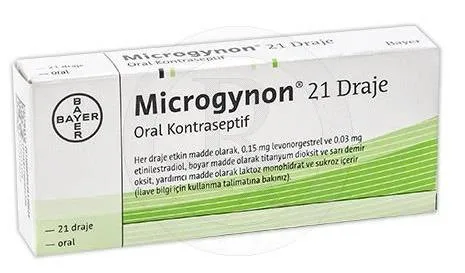Oral contraception and the recognised gynaecological indications for such oestrogen-progestogen combinations.
The decision to prescribe Microgynon 30 should take into consideration the individual woman’s current risk factors, particularly those for venous thromboembolism (VTE), and how the risk of VTE with Microgynon 30 compares with other combined hormonal contraceptives (CHCs)
Tablets must be taken orally in the order directed on the blister package at about the same time every day, with some liquid if necessary.
First treatment cycle: 1 tablet daily for 21 days, starting on the first day of the menstrual cycle. Contraceptive protection begins immediately.
Subsequent cycles: Tablet-taking from the next pack of Microgynon 30 is continued after a 7-day tablet-free interval, beginning on the same day of the week as the first pack. A withdrawal bleed usually occurs during the tablet-free interval.
Changing from 21-day combined oral contraceptives: The first tablet of Microgynon 30 should be taken on the first day immediately after the end of the previous oral contraceptive course. Additional contraceptive precautions are not required.
Changing from a combined Every Day pill (28 -day tablets):
Microgynon should be started after taking the last active tablet from the Every Day Pill pack. The first Microgynon 30 tablet is taken the next day. Additional contraceptive precautions are not then required.
The first tablet of Microgynon 30 should be taken on the first day of bleeding, even if a POP has already been taken on that day. Additional contraceptive precautions are not then required. The remaining progestogen-only pills should be discarded.
Post-partum and post-abortum use: After pregnancy, oral contraception can be started 21 days after a vaginal delivery, provided that the patient is fully ambulant and there are no puerperal complications. Additional contraceptive precautions will be required for the first 7 days of tablet taking. Since the first post-partum ovulation may precede the first bleeding, another method of contraception should be used in the interval between childbirth and the first course of tablets. After a first-trimester abortion, oral contraception may be started immediately in which case no additional contraceptive precautions are required.
Special circumstances requiring additional contraception
Incorrect administration: A single delayed tablet should be taken as soon as possible, and if this can be done within 12 hours of the correct time, contraceptive protection is maintained. With longer delays, additional contraception is needed. Only the most recently delayed tablet should be taken, earlier missed tablets being omitted, and additional non-hormonal methods of contraception (except the rhythm or temperature methods) should be used for the next 7 days, while the next 7 tablets are being taken. Additionally, therefore, if tablet(s) have been missed during the last 7 days of a pack, there should be no break before the next pack is started. In this situation, a withdrawal bleed should not be expected until the end of the second pack. Some breakthrough bleeding may occur on tablet taking days but this is not clinically significant. If the patient does not have a withdrawal bleed during the tablet-free interval following the end of the second pack, the possibility of pregnancy must be ruled out before starting the next pack.
Gastro-intestinal upset: Vomiting or diarrhoea may reduce the efficacy of oral contraceptives by preventing full absorption. If vomiting or diarrhoea occurs within 4 hours of taking Microgynon tablet-taking from the current pack should be continued. Additional non-hormonal methods of contraception (except the rhythm or temperature methods) should be used during the gastro-intestinal upset and for 7 days following the upset. If these 7 days overrun the end of a pack, the next pack should be started without a break. In this situation, a withdrawal bleed should not be expected until the end of the second pack. If the patient does not have a withdrawal bleed during the tablet-free interval following the end of the second pack, the possibility of pregnancy must be ruled out before starting the next pack. Other methods of contraception should be considered if the gastro-intestinal disorder is likely to be prolonged.





